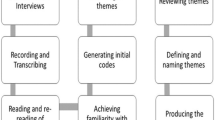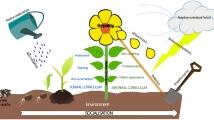Abstract
Using a grounded theory research design, the author examined 180 reflective essays of teacher candidates who participated in a ‘Learning Process Project,’ in which they were asked to synthesize and document their discoveries about the learning process over the course of a completely new learning experience as naïve learners. This study explored (1) the use of grounded theory as a systematic and exploratory research tool, (2) the transformative insights of the teacher candidates as they discovered the impact of the naïve learner perspective on their teaching philosophies, and (3) the role of the naïve learner perspective in effective refinement of teaching and learning ability. Further discussion in this study examined the potential of the ‘Learning Process Project’ to assist post secondary instructors as mentors in supporting empathic teacher candidates who will in turn support and mentor the children in their care.

Similar content being viewed by others
References
Abate, F. J. (2010). Education leadership in a culture of compliance. Phi Delta Kappan, 91(6), 35–37.
Bee, H., & Boyd, D. (2010). The developing child (12th ed.). Boston, MA: Allyn & Bacon.
Bergman, D. J., & Bergman, C. C. (2010). Elements of stylish teaching: Lessons from Strunk and White. Phi Delta Kappan, 91(4), 29–31.
Boyer, W. A. R. (2004). Conflicting views of realistic professionalism: Preservice educators’ concerns arising from analysis of themes in their reflective writings. Early Childhood Education Journal, 32(1), 51–56.
Boyer, W. (2009). Crossing the glass wall: What preschool educators believe about children’s self-regulation and emotion regulation. Early Childhood Education Journal, 37(3), 175–182. doi:10.1007/s10643-009-0343-y.
Creswell, J. W. (2008). Educational research. Planning, conducting, and evaluating quantitative and qualitative research (3rd ed.). Columbus, OH: Merrill Prentice-Hall.
Drews, E. M. (1972). Learning together. How to foster creativity, self-fulfillment, and social awareness in today’s students and teachers. Englewood Cliffs, NJ: Prentice-Hall Inc.
Eisner, E. W. (2002). The kind of schools we need. Phi Delta Kappan, 83(8), 576–583.
Gall, M. D., Gall, J. P., & Borg, W. R. (2010). Applying educational research. A practical guide (6th ed.). Boston, MA: Pearson Education Inc.
Glaser, B. G. (1992). Basics of grounded theory analysis. Mill Valley, CA: Sociology Press.
Goleman, D. (2007). Social intelligence. The revolutionary new science of human relationships. New York, NY: Bantam Books.
Gross, T. (2010). Service learning builds bonds to school for young learners. Phi Delta Kappan, 91(5), 24–26.
Hoffman, M. L. (1982). Development of prosocial motivation: Empathy and guilt. In N. Eisenberg (Ed.), The development of prosocial behavior (pp. 281–314). New York, NY: Academic Press.
Hoffman, M. L. (1988). Moral development. In M. H. Bornstein & M. E. Lamb (Eds.), Developmental psychology: An advanced textbook (2nd ed., pp. 497–548). Hillsdale, NJ: Erlbaum.
Hoffman, M. (2000). Empathy and moral development. New York, NY: Cambridge University Press.
Hoyt, K. B. (2001). Career education and education reform: Time for a rebirth. Phi Delta Kappan, 83(4), 327–331.
Hutchinson, N. (2010). Inclusion of exceptional learners in canadian schools: A practical handbook for teachers (3rd ed.). Toronto, Ontario, Canada: Prentice Hall.
Jalongo, M., Stevenson, L., Davis, A. C., & Stanek, M. L. (2010). Taking children seriously. Early Childhood Education Journal, 38(1), 1–3.
Keefe, J. W., & Jenkins, J. M. (2002). Personalized instruction. Phi Delta Kappan, 83(6), 440–448.
Kielsmeier, J. C. (2010). Build a bridge between service and learning. Phi Delta Kappan, 91(5), 8–15.
Knafo, A., Zahn-Waxler, C., Davidov, M., Van Hulle, C., Robinson, J. L., & Rhee, S. H. (2009). Values, empathy, and fairness across social barriers. In S. Atran, A. Navarro, K. Ochsner, A. Tobena, & O. Vilarroya (Eds.), Annals of the New York Academy of Sciences (Vol. 1167, pp. 103–114). New York, NY: Annals of the New York Academy of Sciences.
Kvale, S. (1996). Interviews. An introduction to qualitative research interviewing. Thousand Oaks, CA: Sage Publications.
Lovell, C. (1999). Empathic-cognitive development in students of counselling. Journal of Adult Development, 6(4), 195–203.
Palmer, P. J. (1998). The courage to teach. Exploring the inner landscape of a teacher’s life. San Francisco, CA: Jossey- Bass Publishers.
Payne, K., & Edwards, B. (2010). Service learning enhances education for young adolescents. Phi Delta Kappan, 91(5), 27–30.
Peske, G., Liu, E., Moore Johnson, S., Kauffman, D., & Kardos, S. M. (2001). The next generation of teachers: Changing conceptions of a career in teaching. Phi Delta Kappan, 83(4), 304–311.
Reiman, A. J., & Thies-Sprinthall, L. (1998). Mentoring and supervision for teacher development. New York, NY: Addison Wesley Longman.
Rueda, M. R., Posner, M. J., & Rothbart, M. K. (2004). Attentional control and self-regulation. In R. F. Baumeister & K. D. Vohs (Eds.), Handbook of self-regulation. Research, theory, and applications (pp. 283–300). New York, NY: The Guilford Press.
Saarni, C. (1993). Socialization of emotion. In M. Lewis & J. M. Haviland (Eds.), Handbook of emotions (pp. 435–446). New York, NY: Guilford Press.
Segal, Z. V., Williams, J. M. G., & Teasdale, J. D. (2002). Mindfulness-based cognitive therapy for depression. A new approach to preventing relapse. New York, NY: The Guilford Books.
Sprinthall, N. A., Sprinthall, R. C., & Oja, S. N. (1994). Educational psychology: A developmental approach (6th ed.). New York, NY: McGraw-Hill.
Strauss, A., & Corbin, J. (1998). Basics of qualitative research. Techniques and procedures for developing grounded theory (2nd ed.). Thousand Oaks, CA: Sage Publications, Inc.
Sumara, D. (2002). Changing the subject: Inventing identities while learning to teach. The Alberta Teachers’ Association Magazine, 82(3), 34–37.
Sutton, J. (2001). An open briefing for President Bush. Phi Delta Kappan, 83(2), 112–118.
Zaff, J. F., & Lerner, R. M. (2010). Service learning promotes positive youth development in high school. Phi Delta Kappan, 91(5), 21–23.
Author information
Authors and Affiliations
Corresponding author
Rights and permissions
About this article
Cite this article
Boyer, W. Empathy Development in Teacher Candidates. Early Childhood Educ J 38, 313–321 (2010). https://doi.org/10.1007/s10643-010-0419-8
Published:
Issue Date:
DOI: https://doi.org/10.1007/s10643-010-0419-8




